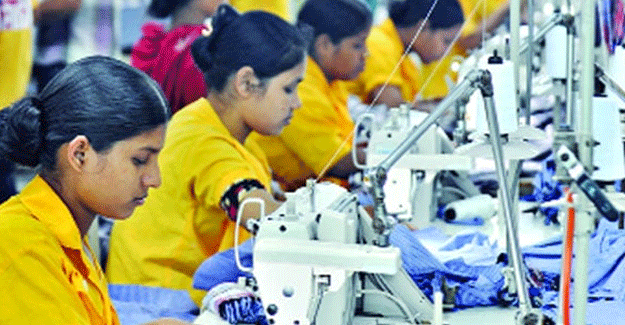
Bulgaria Hiring RMG Workers From Bangladesh
Bulgaria is hiring skilled manpower from Bangladesh with the promise of handsome salaries. As of now, the European market remains one of the top export destinations of Bangladeshi readymade garments (RMG) products. The move reaffirms the presumption that major brands and buyers in Europe and the United States are shifting their focus to nearshoring and automation. According to a recent report by the global consulting firm McKinsey & Company, global apparel brands and retailers have to ramp down RMG imports from Asian countries in order to sustain themselves. "This is the first official move to recruit RMG workers from Bangladesh by any European country," said Faruque Hassan, President, Bangladesh Garment Manufacturers and Exporters Association (BGMEA). Bulgarian firms took this initiative as most buyers want to near-shore products to reduce the lead-time. "We think everyone has the right to choose a better life. The job offers from the Bulgarian factories will help workers to make a good living. At the same time, we are also training more people to make a skilled workforce", he added. Primarily, two Bulgarian companies - AntoanVill and Mizia-96AD - are recruiting 100 workers at a salary of US$ 460 (Tk 45,000) per month. The recruitment process has already started under the supervision of the Bangladesh Overseas Employment and Services Limited (BOESL). These companies are looking for proficient workers, especially sewing machine operators, pressing machine operators and textile tailors, according to BOESL sources. The income of an RMG worker in Bangladesh hovers around Tk8,000 to Tk8,420. Those who will be recruited by Bulgaria will earn five times more than they make in the country. As per the terms of employment, the tenure of the contract will be for a maximum of three years and is renewable. In addition to the monthly salary, airfare, a US$ 50 monthly allowance for meals and a separate room for the accommodation of 3-4 people will be provided by the company. However, electricity and water bills have to be borne by the workers. Compensation for workplace accidents and other matters will be applicable in accordance with Bulgarian labour law. The total migration cost is Tk 52,740, including the Tk 42,000 service charge of BOESL. Banani Biswas, general manager (Overseas Employment) of BOESL, said, "Even though they are hiring 100 workers at the moment, we are hoping to send more in the future." "We have never sent skilled RMG workers to Europe before. Earlier we exported workers to Jordan - a country in western Asia. This is the first time our workers are going to Bulgaria through BOESL," she said. According to the terms of employment, a worker has to work for 8 hours a day. Overtime payments will also be provided as per company policy. Among interested candidates, BOESL is taking vocational assessments every Friday at Bangladesh-Korea Technical Training Centre. Representatives from Bulgaria will select the final candidates through re-examination. Bulgaria has a long history of being a centre of fashion in Eastern Europe. Located at the eastern edge of Europe, Bulgarian fashion manufacturing has been often compared to the high quality of its Turkish neighbours. Family-run production facilities pass down hand skills from generation to generation, and this, mixed with new sewing technology, has made Bulgaria a hotspot for apparel and textile sourcing. Bulgaria has some of the lowest production costs in Europe, and due to its membership of the European Union, it maintains all ethical and environmental standards. The Bulgarian fashion segment revenue was an estimated US$ 324 million in 2018. About 150,000 people are currently employed in the garment and textile industry in Bulgaria, according to Sqetch - an apparel sourcing and product development site. Bangladesh exported apparel to Bulgaria amounting to US$ 1.79 million in FY21, while the RMG shipment was US$ 2.27 million in FY20. Among the recruiting companies, Antoan Vill specialises in the production of high-quality women's clothing since 1998. Apart from this, some Bangladeshis also work in Italy's RMG factories, according to the Ministry of Expatriates' Welfare and Overseas Employment. Within 2025, major brands and buyers from Europe and the United States can cut down on their import of ready-made garments from countries like China, Bangladesh, and Vietnam, according to a global consulting firm McKinsey & Company's report titled,"Is Apparel Manufacturing Coming Home?" The report mentioned that tomorrow's successful apparel companies would be those that take the lead to enhance the apparel value chain on two fronts: nearshoring and automation. Both must be addressed in a sustainable way. Apparel brands and retailers in Europe and the United States can no longer do business as usual and expect to thrive, the report said. In July-May of FY22, readymade garment shipments saw about 35% growth to US$ 38.52 billion over the corresponding period in the previous year, according to data published by the Export Promotion Bureau (EPB). During this period, Bangladesh's exports to the EU were about US$ 19.3 billion, which is 50.11% of total apparel exports, while the United Kingdom and the United States maintain 10.63% and 21.15% shares respectively of Bangladesh's total apparel export. The EU's top 7 export destinations are – Germany with US$ 6.5 billion, Spain with US$ 2.72 billion, France with US$ 2.15 billion, Poland with US$ 1.82 billion, Italy with US$ 1.42 billion, the Netherlands with US$ 1.32 billion, and Denmark with US$ 1.03 billion.
Textile Excellence
If you wish to Subscribe to Textile Excellence Print Edition, kindly fill in the below form and we shall get back to you with details.













